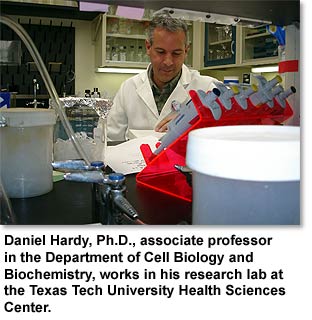Research/Academic Showcase
Women More Likely to Suffer From ACL Injuries
Many may remember Gold Medalist Picabo Street losing control as she made a turn around a skiing gate and tumbled into a fence in 1996. And Lady Raider fans were disappointed as starting senior guard Chesley Dabbs injured her knee in a preseason workout earlier this year. Dabbs is out for the season.
These incidents vividly point to the fact that women often suffer from anterior cruciate ligament or ACL injuries. In fact, they are more likely to suffer from such injuries than are men. This health risk for women is brought to light in a new study by a Texas Tech University Health Sciences Center researcher.
 Estimates show the rate of ACL injuries in females is as much as 10 times
higher than it is in males. Daniel
M. Hardy, Ph.D., associate professor
in the Department of Cell Biology and Biochemistry, received a $1.1 million
grant from the National Institutes of Health in April 2004 to study the
causes of ACL injuries in female athletes. The purpose of the grant, says
Hardy, is to determine if molecular differences can explain why females
are at greater risk of sustaining an ACL injury than males.
Estimates show the rate of ACL injuries in females is as much as 10 times
higher than it is in males. Daniel
M. Hardy, Ph.D., associate professor
in the Department of Cell Biology and Biochemistry, received a $1.1 million
grant from the National Institutes of Health in April 2004 to study the
causes of ACL injuries in female athletes. The purpose of the grant, says
Hardy, is to determine if molecular differences can explain why females
are at greater risk of sustaining an ACL injury than males.
Despite an abundance of theories about why females are more susceptible to this injury, to date no definitive causal link has been found between sex and ACL rupture. In particular, almost no research has been conducted on molecular and genetic factors that might explain the increased rate of ACL injury in women.
“We have discovered that molecular processes governing repair and maintenance of the ACL differ between men and women,” Hardy says. “Our current studies are aimed at identifying additional molecular differences between men’s and women’s ACLs that contribute to the sex disparity in injury rate. We are also determining the underlying causes of those differences, for example, hormonal controls, as well as the biochemical mechanisms by which they affect the size and strength of the ACL.”
These molecular biology studies are the only ones of their kind being conducted on the human ACL. Hardy’s study, “Gender Effects on Anterior Cruciate Ligament Remodeling,” is funded for five years by the NIH’s National Institute of Arthritis and Musculoskeletal and Skin Diseases.
ACL injuries can occur in contact and non-contact sports, but most injuries – about 70 percent – occur in non-contact sports. The activities most associated with significant risk levels for non-contact ACL injuries include those that have extensive pivoting, decelerating, awkward landings and rough or out-of-control play. The American Academy of Orthopaedic Surgeons says the incidence of ACL injuries among women basketball players is twice that for men.
Physicians from Texas Tech University Health Sciences Center and the Lubbock community have developed a Women’s Health Research Coalition to support women’s health research.
The primary focus of the coalition is to address women’s health issues in the community and find the resources to help support this research. The coalition includes Lubbock physicians in private practice, research, multidisciplinary groups and academic settings.
Hardy’s research is the first project the coalition will support. Marsha Sharp, head coach of the Texas Tech University Lady Raiders, hosted an event in her home on Oct. 11 to introduce the coalition to the community. Sharp supports the research and goals of the coalition because as a women’s basketball coach, she has a vested interest in preventing ACL injuries in women.
“Ultimately, we expect this work not only to determine the underlying causes of ACL injuries in women, but also to reveal new, effective ways of preventing them,” Hardy says.
- Suzanna Cisneros Martinez

